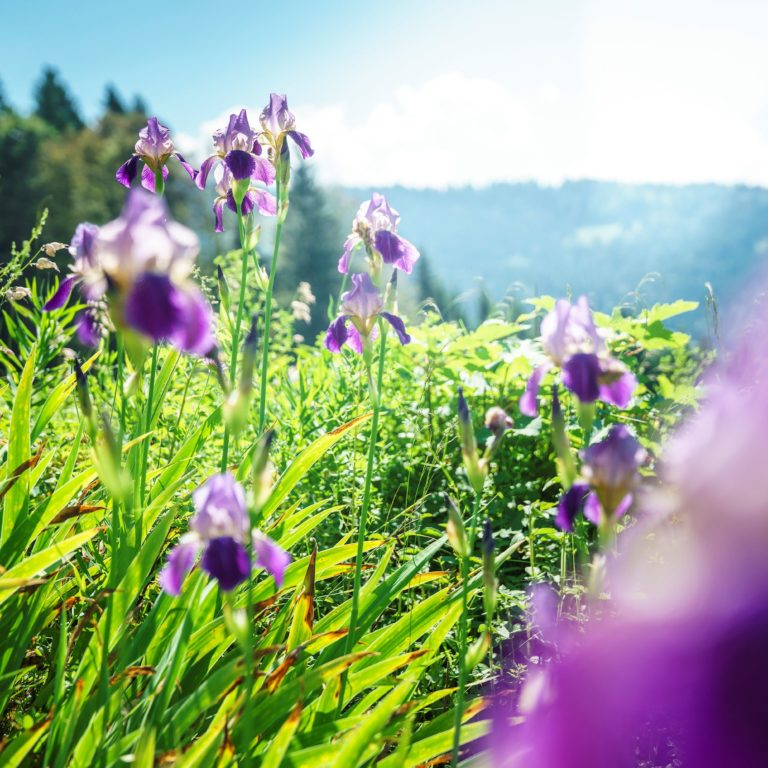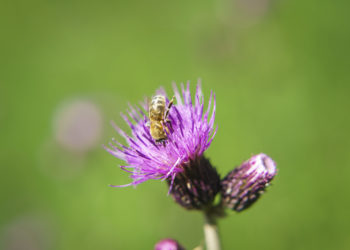
C Flower meadow, Alp Streichbrunnen, Hittisau (c) Dietmar Denger / Vorarlberg Tourismus
Meadow motley
A plant paradise in the Bregenzerwald

C Flower meadow, Alp Streichbrunnen, Hittisau (c) Dietmar Denger / Vorarlberg Tourismus
A plant paradise in the Bregenzerwald
Bregenzerwald
The Steurer family moves up to the Streichbrunnen alp during the summer months. The steep slopes on the alp are only hand-mown once a year, enabling a veritable plant paradise to thrive.
TEXT: THOMAS ZWICKER
The narrow road meanders steeply up the mountain from Hittisau, a village of almost 2,000 inhabitants boasting a fantastic location in the Bregenzerwald. The road goes through alpine meadows, green forests, again and again revealing massive panoramic views to the side.
Then, at a lofty height, a small roadway turns off to the right; two paved tracks feature only high grass between them which swooshes on the spoiler of the car like the rough sea on the bow of a ship. The path comes to an end at a large farm located in the middle of flowering meadows. One half of the farm, adorned with green shutters and window boxes, serves as living quarters for the family, and the other half as a barn for the happy livestock. Veronika and Vinzenz Steurer live on the Streichbrunnen alp with their son Patrik during the summer months. They are mountain farmers. Not only that – they are also Vorarlberg Meadow Champions.
It is very quiet up here, the only sound the ringing of the goats’ bells.
“Depending on the weather, every year around about May we take everything but the kitchen sink and our animals from our farm here in the valley and move up to the alp, lock, stock and barrel,” says Vinzenz Steurer, crotchety and gruff as he is, yet with a warm-heartedness that immediately takes hold of you. “In September, we pull down the shutters and we go back down into the valley – that is the end of our summer on the alp.”
The secrets of biodiversity
During the bright half of the year, the Steurers manage their Streichbrunnen alp, located at an altitude in excess of 1,000 metres above sea level, around 22 hectares in size and already being run by the fourth generation of the family. It is with a great deal of tender loving care and in a sustainable manner according to traditional methods that they farm the alp. And the family are so successful in this endeavour that, last year, they were awarded the title of Vorarlberg Meadow Champion at their first attempt.
“This is the evening primrose,” says Veronika Steurer, “if it closes at midday despite the sun shining, that means that the weather is about to change and it is going to rain.” The cheerful, ruddy-cheeked mountain farmer points at a daisy (“they are good for bile”), next to which marguerites, wild lilies and greater yellow rattles grow. Chives are used in food, mint and wild marjoram are used to make tea. This meadow is also home to several inedible herbs which even the cows give a wide berth to.

The state government of Vorarlberg, in cooperation with the Vorarlberg nature conservation council, have been organising the Meadow Championship since 2002. The UMG environmental office is responsible for evaluating the meadows. Farms practicing minimum ecological standards are eligible to enter. The competition praises all those who stand by their responsibility for the habitat of our state. There are three prize categories: individual space, overall farm and alp farm. In the category alp farm, the aspects of incidence of rare species of plants, balance of the population of species in the meadow, landscape elements, tramping damage, fertilisation using manure yes or no, meadow care and biotope protection are judged.
“We wish to preserve the beauty of nature, our plants. That is why we only mow by hand once a year that which our animals don’t eat and merely weeds. Everything else is left to its own devices.”
It is thanks to this time-intensive method that a colourful sea of flowers blossoms and shines on the meadows of the Streichbrunnen alp, flowers going back centuries continue to thrive here – and this delighted the jurors of the Meadow Championship Vorarlberg. The objective of this competition, held by the state of Vorarlberg, is to reward the energy and time expended by farmers such as the Steurer family in the preservation of the centuries-old use of the areas of unspoilt nature, ensuring the continuing beauty of the Vorarlberg countryside, also creating the basis for its immense relaxation value. One of the criterion considered in the Meadow Championship is the incidence of rare plants on the estate of the pertinent applicant, as well as other endeavours towards farming the meadows in line with the location.
The Steurers first entered the championship in 2015 – hikers constantly stopped by to comment on the beauty of their steep meadow slopes, yet it was with a feeling of trepidation that they submitted their application. “The jurors spent hours in the ferocious heat of July out and about in the meadows, digging up roots and explaining to us what they could be useful for,” says Veronika. “It was only then that we really became aware of the massive diversity we have up here, and we were delighted to win the prize since we put all our life’s blood into our work.”
This also includes affectionate animal husbandry. Around 35 cows, bulls, calves and goats live along with the mountain farmers on the Streichbrunnen alp. It is only at night that they are in the barn – during the day they are free to graze on the fresh mountain herbs. The milk is transported to the valley via cable car – it would be too troublesome to send it to the valley via the narrow, bumpy road over the long term. Veterinary surgeon Daniela Erlenbusch from Hittisau has just popped by. The vet is responsible for many of the farms in this area.
Life in the mountains is simple – there is no electricity or running water
The mountain farmers have to do without many a modern comfort during the summer. There is no water pipe up here, no electricity. The Steurers cook on the wood-burning stove, and get fresh water from mountain springs. One of these springs flows into a small concrete basis in the room next to the kitchen: the food keeps nice and cool in the cold water. “We cannot make ice cubes, that’s all,” regrets son Patrik. At least a small, open four-wheel drive diesel van with a whopping 25 HP helps them to farm the steep slopes of the meadows. “It will soon be 50 years old, but it still gets you out and about reliably,” says Patrik.
Doors are left unlocked on the alp
So what else is life like on the Streichbrunnen alp, in the creaky wooden house with the gorgeous flowers outside the window, protected by a 200-year-old spruce, affording a view across the lovely valley as far as the Widderstein (2,553 metres), Diedamskopf (2,090 metres) and the Hoher Ifen (2,230 metres)? “You don’t have to go around locking the doors up here, it’s safe,” according to farmer Vinzenz. “I will gladly take things over later, I love the countryside up here, it’s beautiful,” says his son.
Mother Veronika proudly points at the Meadow Champion certificate – confirmation that things are going pretty well here, up on her mountain. “We have the view, the tranquillity, nature,” she says, adding, “we don’t know anything else but moving up here year after year.”
We pull down the shutters in September. That is the sign that our summer on the alp is over.